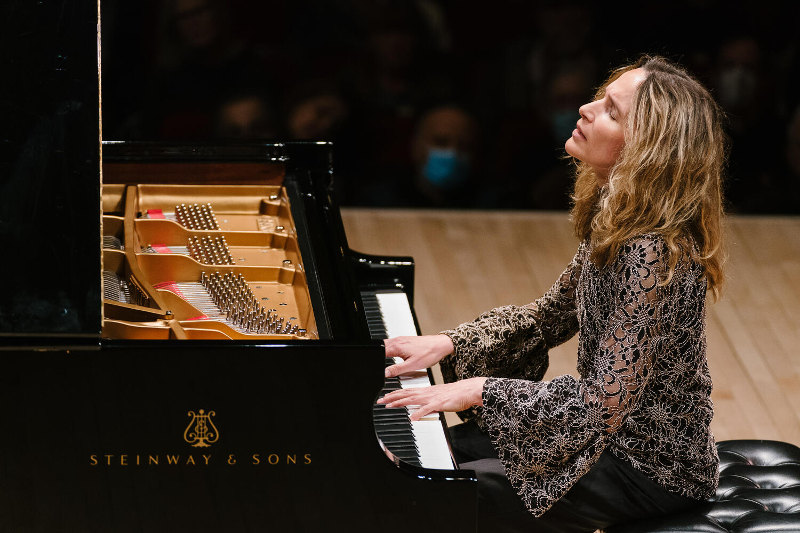
Ed. note: This story by Debra Levine, commissioned and published by the Younes & Soraya Nazarian Center for the Arts, is reprinted with permission.
As a child growing up in Aix-En-Provence, the French-born piano virtuoso, Hélène Grimaud, was rambunctious. Her parents, both professors, clambered to channel her energy. Lessons in martial arts, tennis, and ballet fell by the wayside. Only when a grade-school teacher heard the girl sing was her preternatural gift for music spotted. Then eight years old, Grimaud had missed the cutoff point as a child prodigy. But any lost time she quickly recouped. By 12, she entered Paris’s prestigious Conservatoire National Supérieur de Musique. Her first recording, at 16, of Rachmaninoff, won the Grand Prix du Disque—the French Grammy. Now an indelible musician deeply devoted to concertizing, Grimaud, 53, is a supreme piano virtuoso of our time. A player of electric immediacy whose beauty is at once earthy and ethereal, she attracts both connoisseurs and fans. Grimaud will make her concert debut at The Soraya Thursday January 26 in tandem with the contemporary classical ensemble Wild Up, a Soraya favorite. The evening’s unusual repertoire, personally curated by Grimaud, may give a glimpse into this enigmatic and driven female artist’s soul.
It’s a program Grimaud has both toured with and recorded. It mixes Mozart’s brooding Piano concerto in D minor with works by the esteemed Ukrainian contemporary composer Valentyn Silvestrov, The Messenger and Two Dialogues with postscript. A master of resonant and atmospheric sound, Silvestrov left Kyiv and went into political exile in February 2022, at age 95, speaking out stridently against the heinous invasion of his nation by Russia. He now resides in Berlin. A shared appreciation for Silvestrov’s atmospheric compositions didn’t spur Grimaud’s connection to Chris Rountree, artistic director of Wild Up, per se. But it also didn’t hurt. Their collaboration has been long in the planning.
“We started speaking with Hélène in 2018,” says Rountree, interviewed by phone as he shuttled between wild Up rehearsals and ones at Long Beach Opera, where he is musical director. “We were introduced by Chad Smith of the L.A. Phil. Chad knew that Hélène was looking for …” Rountree pauses, reaching for the precise words: “…a California house band!”
“Pre-pandemic, we had a number of conversations about touring with her. We talked about repertoire: minimalism, Mozart, and then she brought up the idea of Valentyn. He is one of the greatest living composers, and in the U.S. very underperformed. Wild Up had separately performed The Messenger in Laguna with pianist Shai Wosner and Jennifer Koh on violin—and it was great.”
First-time listeners may be puzzled by the familiar phrases afloat in Silvestrov’s music. “I do not write new music,” the maestro has said. “My music is a response to and an echo of what already exists.”
“Silvestrov has multiple styles of composition,” Rountree explains. “In these pieces, he is doing something akin to sampling—like a deejay would do. He’s also following some pathways of the Schubert and Wagner he is quoting, expanding the harmony.”
“In recording technology [terms], it’s like the adding of an acoustic, or adding reverb. It sounds like classical music on a very old record player—and the l.p. is being amplified through a giant tunnel. It feels like ancient music with a ghostly trail behind it. In essence, we are playing a concert of Mozart, Schubert, and Wagner, which is strange for wild Up,” Rountree says with a laugh.
It was Grimaud’s vision to forge a dialogue between Silvestrov and Mozart. “I was always interested in couplings that were not predictable,” she says, “because I feel as if certain pieces can shed a special light on to one another.” Says Rountree, “This is wild Up joining Hélène in her concept, in her focus.” The pianist is, to Rountree’s perception, “total genius. Absolute total genius. She’s one of the great pianists playing the instrument today.”

With her flashing intensity and movie-star looks (think: Adjani mixed with Binoche), she is not averse to exuding passion on stage. She’s the equal of any fortissimo notation, and has pounded her share of keyboards. This untamed side of Grimaud, in evidence since childhood, led to her deep involvement in animal conservation. In 1999, she established the Wolf Conservation Center in upper New York State, where, yes, she talks to the animals. Wolves, in her view, are not only essential “biodiversity engineers,” preserving balances among animal and plant species, but also “endlessly fascinating creatures who have much to teach humans.”

“If you interact with a wild animal, who you cannot expect to meet you on your terms, it’s always a lesson of humility,” she tells Czech interviewer Marek Eben. “You need to have one hundred percent of your attention in the moment, physically, spiritually, emotionally, intellectually. That is very similar to working on a piece of music, when you enter into this tunnel and the piece has to give you the keys to its own secrets.” With a mischievous smile she adds, “The music will always show you it is stronger than you are.” For Grimaud, the sweet spot is at the edge. “If you go at it in a comfortable secure way, something will be missing,” she says. “In that case, we don’t need music performance. You can stay home with your favorite recording.”
“A concert has to be an emotional event,” she insists. “If something special happens, time is suspended. And you can actually alter time; it can stop for a moment when all in the audience are being touched by something. There is a shared freedom; there is an equality to it. It is something very marvelous.”

Kirk, thank you for your comment. She is not just the real deal and a great virtuoso, she’s an artist of the 21st century. She actually has a life or is trying to. She is also a cancer survivor.
She’s got a lovely touch, and a languid timing. Beautiful stuff.